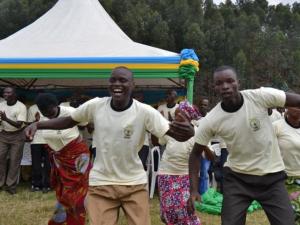
Over 1,000 returnees from DR Congo set to rejoin community after civic education
The Rwanda Demobilisation and Reintegration Commission (RDRC) is on Tuesday, November 17, set to discharge more than 1,000 Rwandans repatriated from DR Congo at the end of last year.
The returnees were accommodated at Nyarushishi Transit Centre in Rusizi District where they were taken through a comprehensive rehabilitation programme.
The programme included awareness on the processes of reconciliation, social cohesion, the course of modern Rwanda, as well as their role and responsibilities as citizens.
"The RDRC intends to discharge over 1,000 dependents of ex-combatants. They will be transported to their home Districts," said Grace Mugabe, the communications expert at the Demobilization Commission.
"During this time the local leaders will receive them and enable them to be reintegrated in the community."
The returnees were accommodated at Nyarushishi Transit Centre in Rusizi District where they were taken through a comprehensive rehabilitation programme.
The programme included awareness on the processes of reconciliation, social cohesion, the course of modern Rwanda, as well as their role and responsibilities as citizens.
"The RDRC intends to discharge over 1,000 dependents of ex-combatants. They will be transported to their home Districts," said Grace Mugabe, the communications expert at the Demobilization Commission.
"During this time the local leaders will receive them and enable them to be reintegrated in the community."
Since the end of last year, hundreds of Rwandans have been repatriated from eastern DR Congo. Majority were dependents, women, children and elderly men, of anti-Rwanda militia groups that have hidden in the neighbouring country ever since they fled Rwanda after perpetrating the 1994 Genocide against the Tutsi.
The ex-combatants were sent to a separate camp in Musanze District while all civilians were sent to the camp in Nyarushishi.
So far, it is known that more than 40 of the returnees were found - after screening - to have had a role in the 1994 Genocide against the Tutsi.
Their forced repatriation last year came after the DR Congo army stepped up an offensive against terror groups in an ongoing effort to rout out all foreign armed militias based in the neighbouring country.
President Félix Tshisekedi vowed to deal with the problem of insecurity in his country, especially in the east where a myriad of militia are wreaking havoc.
Last year especially, anti-Rwanda forces in eastern DR Congo faced the wrath of the Congolese army as the latter steadfastly pushed the militias out of their strongholds. Many militia leaders died along with their fighters while the lucky ones were captured and repatriated to Rwanda.
